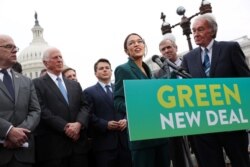U.S. Senator Elizabeth Warren’s relentless focus on economic issues is increasingly resonating with key segments of the U.S. electorate as she campaigns for the Democratic Party’s presidential nomination in the 2020 election.
“I don’t want a government that works for giant corporations. I want one that works for our families,” Warren recently said to a cheering crowd of more than 15,000 supporters at a rally in Seattle, Washington.
A September IBD/TIPP survey of Democrats and independents showed the Massachusetts senator with 24% backing, a close second place to the Democratic front-runner, former Vice President Joe Biden at 28%.
Shaping 2020 election
Even if Warren ultimately fails to get her party’s presidential nod, her detailed economic proposals could shape the 2020 election. Together, they constitute a progressive blueprint for sweeping change in America that challenges other candidates to endorse her agenda or counter it with what they would do instead.
“It’s certainly driving other candidates to have to produce more [policy proposals],” said John Halpin, a Democratic political analyst at the Center for American Progress.
The effect of Warren’s prodigious left-of-center prescriptions in the general election is harder to predict. Some analysts say they could work in President Donald Trump’s favor by alienating moderates wary of expansive and expensive government interventions in the economy.
“When he says that the Democrats are socialists you can point to elements of Elizabeth Warren’s agenda,” said Alex Conant, who worked on Senator’s Marco Rubio’s 2016 presidential campaign and is now a media consultant with Firehouse Strategies.
‘Economic Patriotism’
Warren, first elected to the Senate in 2013, considers herself a capitalist intent on reforming what she sees as a corrupt system that unfairly favors the rich and powerful. Under former President Barack Obama, she both helped create and was the first head of the Consumer Financial Protection Bureau, which seeks to shield Americans from corporate abuses. Before that, she taught law at Harvard University, specializing in commerce and bankruptcy.
Her “Economic Patriotism” plan in some ways echoes President Trump’s “America First” rhetoric to protect jobs and industries in the U.S. However, unlike the president, who has mostly employed unilateral tariffs to help U.S. companies compete, and whose signature legislative achievement was a corporate tax cut to stimulate economic growth, Warren proposes increasing taxes on the rich, restricting corporate power and using government intervention to spur job creation and increase wages.
Warren’s proposals include:
- Taxing the ultra-rich and big corporations. Individuals and families earning between $50 million and $1 billion would pay an extra 2% in federal taxes that would increase to 3% for those making even more. Her campaign says this tax would bring in $2.75 trillion over 10 years. Corporations would also pay an additional 7% tax on profits above $100 million.
- Trade deals that focus on workers, transparency and human rights. Warren lists a number of trade pre-conditions including human and labor rights, and said any agreement must protect domestic industries. Warren has criticized Trump’s tariffs as “reckless” but has indicated she might impose similar measures as part of a “coherent trade policy.”
- Breaking up big tech companies. Warren justifies the need to increase competition and innovation in this field by noting that nearly half of all e-commerce in the U.S. goes through Amazon and more than 70% of all Internet traffic goes through sites owned or operated by Google or Facebook.
- Creating a new Department of Economic Development focused on jobs that would consolidate business-oriented federal government agencies. The new department would closely regulate U.S. corporations and greatly expand federal training programs. It would also boost research and development spending to help American workers and U.S. technology compete in the global marketplace.
- Requiring corporations to obtain a federal charter legally obligating the companies to serve the greater public interest, rather than chase short-term profits.
- Mandating corporations give workers representation on boards of stakeholders, and mandating that 75% of stakeholders approve all political contributions.
- Requiring the U.S. government to buy American-made products whenever possible, to use billions of dollars in federal spending to develop domestic industries.
- Devaluing the U.S. dollar to in increase U.S. exports.
Warren also supports the “Medicare For All” plan, first proposed by rival Democratic candidate Vermont Senator Bernie Sanders, that would provide government funded health care to all Americans, and a plan to make public colleges free.
In addition, she has endorsed the Green New Deal to end U.S. dependency on fossil fuels, which was introduced by New York Congresswoman Alexandria Ocasio-Cortez, a progressive firebrand. In addition, Warren has proposed investing $2 trillion in federal funding to develop renewable energy programs. She also would direct the U.S. military, the single largest government consumer of energy, to reduce carbon emissions.
German model
Although Warren describes herself as a capitalist, Republican critics have tried to portray her as a socialist whose costly, interventionist polices would stifle economic growth, innovation and end up hurting workers by reducing the number of jobs.
Progressive supporters commend her detailed plans to regulate capitalism and free markets to benefit workers, whose wages have lagged far behind soaring corporate profits.
Parts of Warren’s industrial and trade policies are based on Germany’s business-government collaboration model that has protected manufacturing jobs while expanding trade to low wage countries like China.
Jeromin Zettelmeyer, a former economic policy director for the government of Germany, unfavorably compared Warren’s proposed industrial policies to Germany’s experience. Now a senior fellow at the Peterson Institute for International Economics, he called Warren’s plans to increase worker training and development a move in the “right direction.”
However, in a recent article for the non-partisan think tank website, Zettelmeyer said “she’s wrong” to suggest Germany’s trade surplus was the result of government policy and not market forces such as Chinese demand for high quality German products.
Election divide
If she becomes the Democratic nominee, Warren is betting that her detailed plans to tax the rich and help the poor and middle class will resonate with traditional Democratic constituencies and win back working class voters in manufacturing states who voted for Trump in 2016.
“Warren’s pretty clear that she’s fighting for working people of all races, the middle class and against plutocrats and corrupt politicians,” Halpin said.
At the same time, Warren’s embrace of sweeping government economic intervention and higher taxes could alienate free market-minded voters, including many who are weary of Trump’s style of governance and divisive messaging.
“There’s a lot of Republicans that held their noses and voted for Trump in 2016 and will probably do it again in 2020, if somebody like Elizabeth Warren is the Democratic nominee,” former Republican strategist Conant said.









